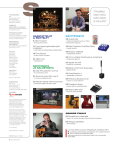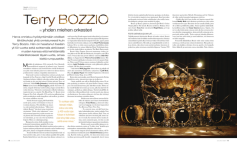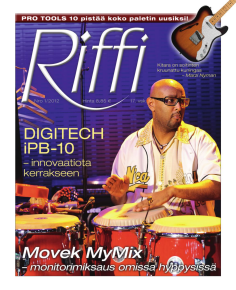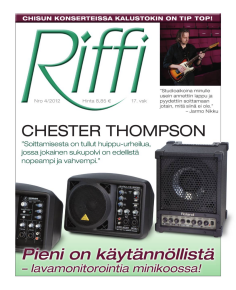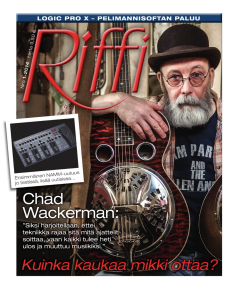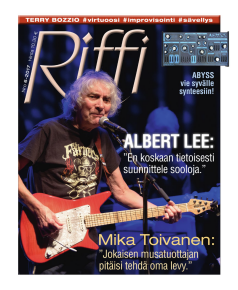Riffi
Automatic translation:
Nyman received a lot of praise from listeners when he performed
Frank Zappa's compositions with the UMO Jazz Orchestra. – It
was an amazing experience to be a soloist with UMO for the first
time. Since then, we did quite a few Zappa gigs over the course
of a few years. That music was my characteristic ground harmoniously
and rhythmically. UMO is a great band full of amazing players.
It has left me with warm memories. Seppo Kantonen, in particular,
dug things out of his endless arsenal that gave me a boost.
Nyman originally got to know Frank Zappa through Steve Vai.
Vai was Zappa's "stunt guitarist" when he was young. "When I
realized that Vai drew a lot of his harmony and aesthetics from
Zappa, I found all the countless Zappa records. It was great
to see that there are many very passionate Frank Zappa fans
in Finland. Wherever I went, I always met people who knew an
awful lot about Zappa and enlightened me with their stories.
(read
more)
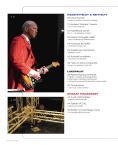
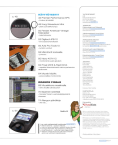
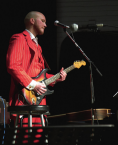
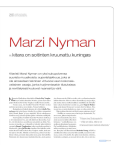
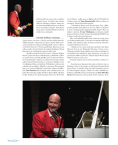
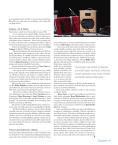
Automatic translation:
Thompson has also shared with his students wisdom about composure
and work, which he himself absorbed from his greatest music
teacher, Frank Zappa. Zappa certainly taught his musicians to
practice.
"If there was a really difficult part of the song with Mothers,
we slowed down and slowed down – until we folded. It was an
absolutely awesome training method that anyone can learn anything
as long as they repeat long enough! With Zappa, I first learned
to play all the notes that have been written, and then in the
Weather Report I learned which ones to leave out. (read
more)
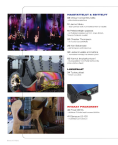
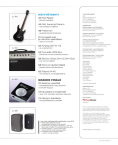
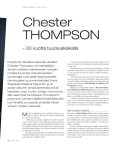
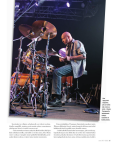
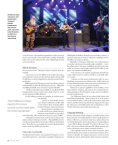
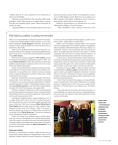
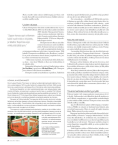
2014 February
No. 1
Chad Wackerman – nopeammin, rennommin, musikaalisemmin
By Tommi Saarela, pp 12-15
Automatic translation:
Chasing Reindeer
On Zappa's legendary "Broadway the Hard Way" world tour in 1988,
the songs were astonishingly precise, starting at the right
tempos without any time lags. The maestro would start the songs
by clapping his hands and the music would take off like a train.
The band was suspected of using a click.
– We never played with a click with Zappa, not once, Wackerman
gasps. – It's a clever trick, a classic tool, or metric or polyrhythmic
modulation. You take one note value and change it to another
note value, which gives you a new tempo.
In the rehearsals before the tour, the songs were learned in
blocks of several songs. Zappa arranged the songs within a block
so that the triplet notes of the previous 4/4 song could correspond
to the 16th notes of the next song, for example.
In this way, the internal relationships between the song blocks
were put together. The problem only arose because there were
about a hundred songs rehearsed for the tour, and two or three
dozen blocks. Of course, since they couldn't all be played every
night, Zappa varied the repertoire depending on the venue and
the mood.
– Every ten minutes before going on stage, Frank would give
a song list, in which he had included the transitions between
song blocks, so that they could be passed over smoothly. For
example: "Chad, today, at the end of the last song in this block,
play a four-bar drum roll that starts normally but the last
two bars are beats in quints, which correspond to the 16th notes
of the next song." Every night my song list was full of these
little reminders. Wackerman laughs.
In addition to the song swapping, Zappa wanted to bring a refreshing
sense of randomness to the stage by introducing a "secret word
of the day" at every gig, an inside joke that kept the group
alert during the long tour. Zappa – especially with Ike Willis
– would slip that password here and there, with the goal of
improvising rhymes for the word on the fly
Director Zappa's musical circus was seen in Helsinki for the
last time on the evening before May Day 1988. The secret word
in the ice rink was – what else but "reindeer". A week later,
the gig in Barcelona was immortalized as a documentary for posterity
in a state-of-the-art multi-camera production, and the European
tour ended in Italy in the summer. The tour was Zappa's last.
(read
more)
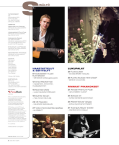
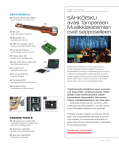
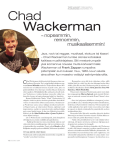
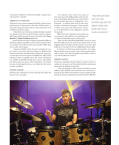
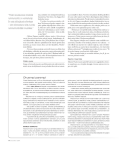
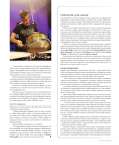
Automatic translation:
Frank Zappa's openings in classical music not only inspired,
but also indirectly led to significant encounters. "Gail arranged
great things for which I will be eternally grateful to her.
He took me to a rehearsal for the Los Angeles Philharmonic to
meet Pierre Boulez while working on Arnold Schoenberg's Jacob's
Ladder. Also later in New York, I was able to meet Edgard Varèse's
collaborators and Elliott Carter through Gail. I also saw Varèse's
house on Sullivan Street. Unforgettable moments from which I
have drawn immeasurably into my solo repertoire. (read
more)
